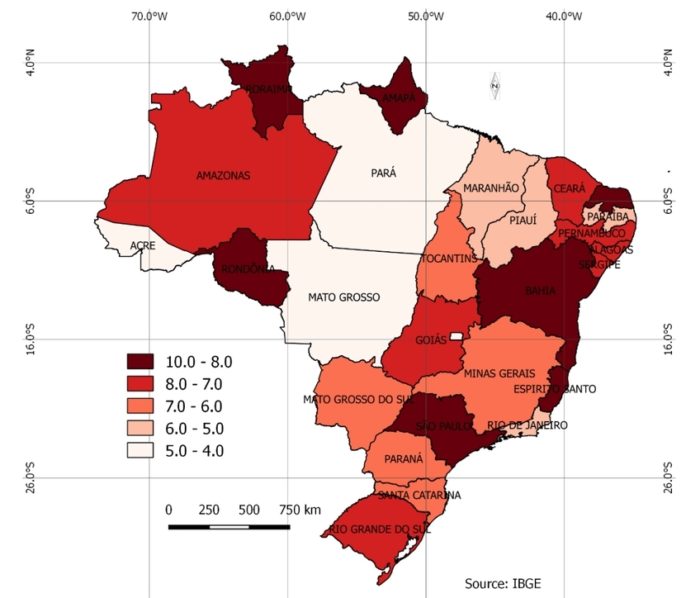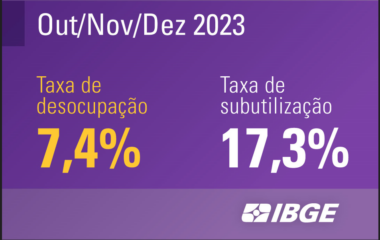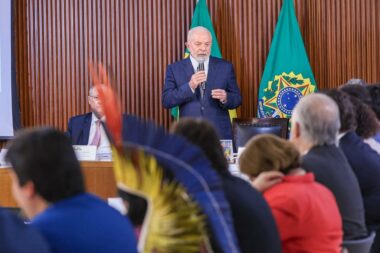Brazil, without a defined budget the 2021 Census is canceled
In an interview with Dire agency, the former president of IBGE Roberto Olinto Ramos spoke about the importance of the Demographic Census and about whether or not the survey was carried out this year

By João Marcelo
SAO PAULO – The Demographic Census of the population of Brazil was scheduled for the year 2020, but due to the pandemic of COVID-19 the survey was postponed to this year, however, the IBGE (Brazilian Institute of Geography and Statistics) suffered a great deal budget cut, which resulted in the survey being canceled. Congress decided to allocate only R $ 71 million for research, less than 5% of the agreed cost, which was around 2 billion reais.
In an interview with Dire agency, the former president of IBGE Roberto Olinto Ramos spoke about the importance of the Demographic Census and about whether or not the survey was carried out this year. According to Ramos, the budget cut is unjustifiable and that the census is of fundamental importance for the planning of the country’s policies at all levels, national, state and municipal. “The operation of the Census for any country is extremely fundamental for any subsequent data generation.
It is a moment that you will thoroughly build up the necessary data so that you can decide the future of the country in any other area ”. The former president explained. Among the problems caused by the delay is the distribution of public resources, since the volume transferred in the quotas of state and municipal participation funds is based on the number of inhabitants of each location. The number of residents helps to define, for example, the transfer coefficients of the FPM (Municipal Participation Fund), one of the main sources of revenue for city halls, used mainly to pay the payroll.
Without a new population count, estimates are out of date. However, Roberto Olinto points out that it is necessary to assess whether this year is the ideal time for the Census. According to the researcher and former president of IBGE, the argument used last year for not carrying out the research remains this year, as the pandemic is at its worst in the country. In addition, Ramos points out that the pandemic temporarily changed the demographic distribution in the country, in addition to income and family organization, and if the census was carried out it could bring data without the necessary precision.
IN BRASILE TAGLI AL BUDGET, IL CENSIMENTO SALTA ANCHE QUEST’ANNO
Di João Marcelo
SAN PAOLO DEL BRASILE – In Brasile i tagli al budget sofferti dall’Instituto Brasileiro de Geografia e Estatistica (Ibge) hanno portato all’annullamento del censimento della popolazione che si sarebbe dovuto svolgere quest’anno. Il Congresso ha deciso infatti di destinare alla ricerca solo 71 milioni di reais, circa il 5 per cento della quota inizialmente accordata, che si aggirava intorno ai due miliardi, ovvero poco piu’ di dieci milioni di euro invece che circa 302 milioni. Il censimento era inizialmente previsto per l’anno scorso ma è stato posticipato a causa della pandemia di Covid-19.
In un’intervista con l’agenzia di stampa Dire l’ex presidente di Ibge, Roberto Olino Ramos, ha parlato dell’importanza del censimento demografico e della possibilità di realizzarlo o meno quest’anno. Secondo Ramos, il taglio al budget è ingiustificabile, dato che il censimento è di fondamentale importanza per la pianificazione delle politiche de Paese in tutto e a tutti i livelli: nazionale, statale e municipale.
“È un’opera fondamentale per qualsiasi Paese per ogni successiva generazione di dati”, ha affermato Ramos. “È un momento che serve a raccogliere minuziosamente i dati necessari per poter decidere del futuro del Paese in qualsiasi settore”. Tra i problemi principali provocati da questo ritardo nell’effettuare la rilevazione c’è quello relativo alla distribuzione delle risorse pubbliche, visto che il volume di denaro trasferito alle quote dei fondi di partecipazione statale e municipale si basa sul numero di abitanti di ogni entità.
I dati sui cittadini residenti aiuta a definire, ad esempio, il coefficiente di trasferimento al Fundo de Participacao dos Municipios (Fpm), una delle principali fonti di entrate delle prefetture, impiegato soprattutto per sostenere i costi a libro paga. Senza un nuovo conteggio della popolazione, le stime rimangono non aggiornate.
L’ex presidente di Ibge ha evidenziato comunque che è necessario valutare se questo anno è quello adeguato per realizzare il censimento. Secondo Ramos, infatti, la ragione che ha motivato lo spostamento di data l’anno scorso resta valido anche nel 2021, visto che ora il Paese si trova a far fronte alla fase peggiore della pandemia.
L’ex presidente ha sottolineato inoltre che la ricerca quest’anno potrebbe tracciare una panoramica imprecisa della popolazione, visto che la crisi sanitaria ha modificato temporaneamente la distribuzione demografica del Paese, oltre che i redditi e le strutture familiari.
SEM ORÇAMENTO DEFINIDO, REALIZAÇÃO DO CENSO 2021 É CANCELADO
Por João Marcelo
SAO PAULO – O Censo Demográfico da população do Brasil estava agendado para o ano de 2020, mas por conta da pandemia da COVID-19 a pesquisa foi adiada para este ano, entretanto, o IBGE (Instituto Brasileiro de Geografia e Estatística) sofreu um grande corte no orçamento, o que resultou no cancelamento da pesquisa. O Congresso decidiu destinar apenas R$ 71 milhões para a pesquisa, menos de 5% do custo acordado, que girava em torno de 2 bilhões de reais.
Em entrevista à agência Dire, o ex-presidente do IBGE Roberto Olinto Ramos contou sobre a importância do Censo Demográfico e sobre a realização ou não da pesquisa neste ano. De acordo com Ramos, o corte orçamentário é injustificável e que o censo é de fundamental importância para o planejamento das políticas do país em todos os níveis, nacional, estadual e municipal. “ A operação do Censo para qualquer país é extremamente fundamental para qualquer geração de dados posteriores. É um momento que você vai minuciosamente construir os dados necessários para que você possa decidir em qualquer outra área o futuro do país”.
Explicou o ex-presidente. Entre os problemas causados pelo atraso está a distribuição de recursos públicos, já que o volume transferido nas cotas dos fundos de participação estaduais e municipais tem por base o número de habitantes de cada local. O número de moradores ajuda a definir, por exemplo, os coeficientes de repasse do FPM (Fundo de Participação dos Municípios), uma das principais fontes de receita das prefeituras, usado sobretudo para custear a folha de pagamento.
Sem a nova contagem da população, as estimativas ficam defasadas. Entretanto, Roberto Olinto ressalta que é preciso avaliar se este ano é o ideal para a realização do Censo. De acordo com o pesquisador e ex-presidente do IBGE o argumento usado no ano passado para não realizar a pesquisa se mantém neste ano, visto que a pandemia se encontra em seu pior momento no país. Além disso, Ramos ressalta que a pandemia modificou de maneira temporária a distribuição demográfica no país, além da renda e da organização familiar e caso o censo fosse realizado poderia trazer dados sem a precisão necessária.
Le notizie del sito Dire sono utilizzabili e riproducibili, a condizione di citare espressamente la fonte Agenzia DIRE e l’indirizzo www.dire.it










